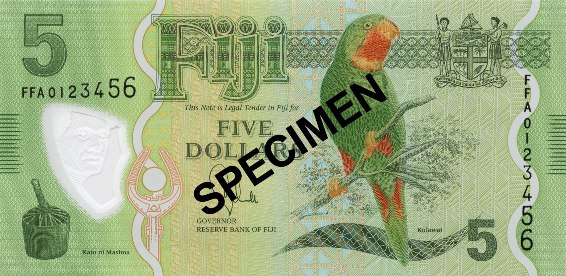 A few days ago I wrote about the Canadian polymer banknotes which faced with all kinds of criticism and complaints. From serious ones to the more ludicrous. The list seems to grow longer every day. And now a new complaint has been made about the 20 Dollar note.
A few days ago I wrote about the Canadian polymer banknotes which faced with all kinds of criticism and complaints. From serious ones to the more ludicrous. The list seems to grow longer every day. And now a new complaint has been made about the 20 Dollar note.
Sean Blaney, senior botanist of the Atlantic Canada Conservation Data Centre, claims that the maple leaf shown on the banknote is not the sugar maple (which is featured on the national flag) but in fact the Norway maple.
"It's a species that's invasive in Eastern Canada and is displacing some of our native species, and it's probably not an appropriate species to be putting on our native currency," Blaney told CBC News.
The central bank said the image on the new bills was purposefully designed not to represent any specific species but rather to be a combination of various kinds. "It is not a Norway maple leaf. It is a stylized maple leaf and it is what it ought to be," said Bank of Canada currency spokesman Julie Girard. Mr. Blaney doesn't buy this explanation and thinks the Bank has made an error.
Below are both leaves. On the left is the Norway maple leaf and on the right is the sugar maple. So who's right?

 Radio New Zealand reports that banknotes bearing the signature of new Reserve Bank Governor Graeme Wheeler may not be in circulation till the end of next year. The Reserve Bank of New Zealand says all notes produced since Mr Wheeler took over the governor's position will have his signature on them.
Radio New Zealand reports that banknotes bearing the signature of new Reserve Bank Governor Graeme Wheeler may not be in circulation till the end of next year. The Reserve Bank of New Zealand says all notes produced since Mr Wheeler took over the governor's position will have his signature on them.
But it will take some time to work through a stock of notes bearing the signature of previous governor, Alan Bollard, who left the bank after 10 years last September. A spokesperson said how quickly notes bearing the signature of the new governor will be in circulation, will depend on demand for new notes. Given expected levels of demand it could be late 2014 before the public see notes bearing Mr Wheeler's signature.
Graeme Wheeler was appointed Governor of the Reserve Bank of New Zealand in September 2012.
Two stories about the preparation for the festivities in Singapore and Macau regarding the Lunar New Year (10 februari 2013). Traditionally people want new and special banknotes as a gift for loved ones... but also to speculate.
 Macau has authorised the Banco Nacional Ultramarino (BNU) and the Bank of China from 2012 to 2023 to issue a maximum of 20 million special notes with a face value of 10 patacas for the forthcoming Lunar Year of the Snake. Last year with the Year of the Dragon 'only' 10 million notes were printed which led to ridiculous speculation. Especially the banknotes with one or more 8's at the end of the serial number were sold for top prizes.
Macau has authorised the Banco Nacional Ultramarino (BNU) and the Bank of China from 2012 to 2023 to issue a maximum of 20 million special notes with a face value of 10 patacas for the forthcoming Lunar Year of the Snake. Last year with the Year of the Dragon 'only' 10 million notes were printed which led to ridiculous speculation. Especially the banknotes with one or more 8's at the end of the serial number were sold for top prizes.
 Singapore in the meantime has a tradition of presenting clean crisp new banknotes to family and friends for Hong Bao, the Lunar New Year. The Monetary Authority of Singapore (MAS) has urged the people of Singapore to use "good as new" notes instead of the crispy new ones. In the past MAS would print and issue an additional 50 million notes to meet the temporary demand for uncirculated notes, but this was much more than the economy actually needed to function. By encouraging the public to accept these "good as new" recirculated notes, MAS hopes to cut its production costs and is also marketing the effort as good for the environment.
Singapore in the meantime has a tradition of presenting clean crisp new banknotes to family and friends for Hong Bao, the Lunar New Year. The Monetary Authority of Singapore (MAS) has urged the people of Singapore to use "good as new" notes instead of the crispy new ones. In the past MAS would print and issue an additional 50 million notes to meet the temporary demand for uncirculated notes, but this was much more than the economy actually needed to function. By encouraging the public to accept these "good as new" recirculated notes, MAS hopes to cut its production costs and is also marketing the effort as good for the environment.
Happy Lunar New Year!
 Samoa has issued a new type of their 100 Tala note. The image is more are less the same as the old note but this one has new signatures (Faumuina Tiatia Faaolatane Liuga and Maiava Atalina Ainuu-Enari) and there is pattern visible at the top and bottom of the note which wasn't there before.
Samoa has issued a new type of their 100 Tala note. The image is more are less the same as the old note but this one has new signatures (Faumuina Tiatia Faaolatane Liuga and Maiava Atalina Ainuu-Enari) and there is pattern visible at the top and bottom of the note which wasn't there before.
Is it just me or does Samoa always nail it with their design? The last series of banknotes is stunning!
Pictures from another site, I'm looking for a 'clean' version without a link on it.
 Banknotenews reports that Paraguay is going to issue a new 5000 guarani note made from polymer. This will be the first polymer note for Paraguay. According to this post the note will be issued on 14 January 2013. The new banknote appears to be dated 2011, and is probably printed by Canadian Bank Note Company.
Banknotenews reports that Paraguay is going to issue a new 5000 guarani note made from polymer. This will be the first polymer note for Paraguay. According to this post the note will be issued on 14 January 2013. The new banknote appears to be dated 2011, and is probably printed by Canadian Bank Note Company.
Video after the click
Read More
 Besides the presentation of the new 5 euro yesterday the European Central Bank also had other news to report. The ECB said it removed 12,4% fewer counterfeit euro banknotes from circulation in 2012 than in the previous year. The bank withdrew about 531.000 forged notes compared with 606.000 in 2011.
Besides the presentation of the new 5 euro yesterday the European Central Bank also had other news to report. The ECB said it removed 12,4% fewer counterfeit euro banknotes from circulation in 2012 than in the previous year. The bank withdrew about 531.000 forged notes compared with 606.000 in 2011.
The 20 euro and 50 euro notes continue to be the most forged (together 82,5% of all discovered fakes). The 100 euro banknote was the third-most counterfeited denomination (13%). A complete breakdown of the numbers:
"When compared with the number of genuine euro banknotes in circulation (on average 14.9 billion during the second half of 2012), the proportion of counterfeits remains very low" according to the ECB.
The majority (97.5%) of counterfeits recovered in the second half of 2012 were found in euro area countries, with only around 2% being found in EU Member States outside the euro area and 0.5% being found in other parts of the world.
All has been revealed!
Mario Draghi, President of the European Central Bank (ECB), today unveiled the Europa series €5 banknote. The unveiling was the highlight of the opening of the “New Face of the Euro” exhibition, which is being held at the Archaeological Museum in Frankfurt am Main from 11 January to 10 March 2013.
The new €5 banknote has benefited from advances in banknote technology since the first series was introduced over ten years ago. It includes some new and enhanced security features. The watermark and hologram display a portrait of Europa, a figure from Greek mythology – and hence the name of this series of banknotes. An eye-catching “emerald number” changes colour from emerald green to deep blue and displays an effect of the light that moves up and down.
Short raised lines on the left and right edges of the banknote make it easier to identify the banknote, especially for visually impaired people.
These security features are planned to be included in all the new banknotes. They are easy to check using the “feel, look and tilt” method.
The new series has the same “ages and styles” design and dominant colours as the first series. The €5 will be the first banknote to be issued, starting on 2 May 2013. The other denominations, i.e. €10, €20, €50, €100, €200 and €500, will be introduced over the next few years, in ascending order.
The first series will initially circulate alongside the new banknotes, but will gradually be withdrawn and eventually cease to be legal tender. The date when this occurs will be announced well in advance. However, the banknotes of the first series will retain their value indefinitely and can be exchanged at euro area national central banks at any time.
Further information is available in a press kit and at www.newfaceoftheeuro.eu. This website also includes the “Euro Cash Academy”, a learning module which takes a playful approach to the new €5 and other euro banknotes. In addition, leaflets about the new €5 will be distributed to banks, shops and other businesses across the euro area in April 2013. All these measures should give the public and professional cash handlers an opportunity to learn about the new banknotes in good time and this should ensure a smooth introduction of the Europa series.
Another new security feature is the introduction of a security thread. The € symbol and the value of the banknote can be seen in tiny white lettering in that stripe:
Some downloads:
- Pictures (zip - < 1 MB)
- Press Kit (pdf)
- Footage of the new €5 banknote (design and security features) (zip - 357 MB)
- Footage of the production of the new €5 banknote (zip - 918 MB)
Set your clocks to 16:30 CET when the new 5 euro will be unveiled by Mario Draghi of the ECB.
 I just saw this great numismatic product mentioned at banknotenews. It's a special currency set commemorating the 150th anniversary of the United States Bureau of Engraving and Printing.
I just saw this great numismatic product mentioned at banknotenews. It's a special currency set commemorating the 150th anniversary of the United States Bureau of Engraving and Printing.
This information is from their website:
This limited edition two-note set features a Series 2009 $2 note from the Federal Reserve Bank of New York and a Series 2009 $5 note from the Federal Reserve Bank of Chicago. The Series 2009 $2 note bears a serial number beginning with "2012," to commemorate 150 years of pride, craftsmanship, and innovation. The Series 2009 $5 note begins with serial number "1862," to symbolize the origin of the BEP. For each set, the last four digits of the serial numbers on the $5 and $2 notes match.
This exquisitely crafted set includes a 52 page booklet, "150 Years of Pride, Craftsmanship, and Innovation." This informative booklet traces the Bureau of Engraving and Printing’s rich history and evolution, and includes a certificate authenticating the enclosed notes as genuine United States currency.
Each note is protected by a clear, acid-free polymer sleeve and encased in an attractive folder.
Drawing: All customers who purchase the 150th Anniversary Currency Set during the first month of release will be entered into a drawing to win the opportunity to purchase one of the first 150 sets based on serialization. These first 150 sets will feature personally signed $2 and $5 notes by Treasurer of the United States Rosie Rios. Customers will be enrolled into the drawing equal to the number of sets purchased during the one month enrollment period (December 11, 2012 – January 10, 2013). A quantity restriction of two sets will be imposed for drawing winners. Customers who win the drawing will not be permitted to return previously purchased sets in lieu of any set won and purchased via the drawing. Drawing winners will be contacted after January 11, 2013, via phone/email. Drawing winners are not obligated to purchase the signed 150th Anniversary Currency Sets.
The 150th Anniversary Currency Set is limited to 10,000 total units.
Bulk pricing is available for the 150th Anniversary Currency Set at a price of $44.95 per unit for quantities of 10 or more.
Sounds like a great gift to me!
 The Bangko Sentral ng Pilipinas (BSP) has recently issued an overstamped note to commemorate 100 years of Masonry in the Philippines. This note was originally available only in sheets of four uncut notes packaged in a folder. Since then, the BSP has begun issuing individual notes into circulation.
The Bangko Sentral ng Pilipinas (BSP) has recently issued an overstamped note to commemorate 100 years of Masonry in the Philippines. This note was originally available only in sheets of four uncut notes packaged in a folder. Since then, the BSP has begun issuing individual notes into circulation.
There have been several commemorative issues of this 100 Peso note. The list can be found here.
 And after Somalia now Angola has also announced it will postpone the introduction of the new 5000 and 10.000 kwanza notes. They were initially scheduled for January 2013 but they will be issued later this year.
And after Somalia now Angola has also announced it will postpone the introduction of the new 5000 and 10.000 kwanza notes. They were initially scheduled for January 2013 but they will be issued later this year.
You can read more information about these notes in this post I wrote last month. A translation of the article mentioned above can be found here.
 A story from war torn Somalia today. The Somali federal government announced that it would postpone the introduction of new Somali Shilling. These banknotes were printed in Sudan and were ordered by the previous Transitional Federal Government. The introduction has been postponed to "a later date".
A story from war torn Somalia today. The Somali federal government announced that it would postpone the introduction of new Somali Shilling. These banknotes were printed in Sudan and were ordered by the previous Transitional Federal Government. The introduction has been postponed to "a later date".
This probably has something to do with the lack of centralized financial institutions in Somalia which has been plagued by civil war and unrest for so many years. Currently the only Somali currency in use is the 1000 Shilling note first issued in 1990 and as a second issue in 1996. Somaliland and Puntland, which are autonomous parts of Somalia, have introduced or tried to introduce new banknotes but the central government hasn't. For many years you couldn't even speak of a central government. The Somaliland currency is not internationally recognized (though the region is recognized as an autonomous region). Puntland announced last year it would introduce its own currency but hasn't yet. The lack in Somali currency even prompted local warlords and businessmen to print their own currency. The US dollar is also widely used in Somalia.
 The central bank of Morocco has issued the new 25 dirham. According to this press release posted on 28 December 2012 (in french, or in the english translation by Google) 4.2 million notes have been issued to commemorate the 57th anniversary of Morocco's independance and also the 25th birthday of the inauguration of Dar-Assikkah (Mint).
The central bank of Morocco has issued the new 25 dirham. According to this press release posted on 28 December 2012 (in french, or in the english translation by Google) 4.2 million notes have been issued to commemorate the 57th anniversary of Morocco's independance and also the 25th birthday of the inauguration of Dar-Assikkah (Mint).
A limited series of 200.000 notes numbered 00001000 to 20000000 have been reserved for collectors. The new banknote is the first to be printed on Durasafe. More information can be found in this post.
 Do you sometimes have that feeling that you've made something really pretty like a painting of your dog and after it's done, somebody comes along and mentions that you've forgotten to paint a tail? That must have been the feeling the Bermuda Monetary Authority (BMA) had when they unveiled their new 50 Dollar banknote with beautiful pictures of local birds on it.
Do you sometimes have that feeling that you've made something really pretty like a painting of your dog and after it's done, somebody comes along and mentions that you've forgotten to paint a tail? That must have been the feeling the Bermuda Monetary Authority (BMA) had when they unveiled their new 50 Dollar banknote with beautiful pictures of local birds on it.
Local birds? Not according to ornithologist David Wingate who stated that the bird on the banknote was in fact NOT the local white-tailed tropicbird but rather a red-billed tropicbird. So what did the BMA do? Did they destroy all the wrong banknotes and quickly issued the right ones? No. They stated that it was indeed the wrong bird but that this one looked much nicer against the background than the right bird...
I had the exact same feeling with our former dutch banknote. Instead of a firehouse, they should've put the Eiffel Tower on it. It's not a dutch building but that's just a minor detail of course.
Apparently the BMA had a change of heart because revised banknotes have been issued. This time with the right local bird on it and with a slightly different colour scheme. The prefix of the serial number has also been changed. The issue date for the old and new banknote remains the same: 1 January 2009.
On the left is the old banknote and on the right the revised version.
Source
 As announced in this previous post, Fiji has issued its new banknotes yesterday 2 January 2013. The colourful notes have all been issued except for the 5 Dollar banknote. This is the only polymer note in this series and has been delayed until April for unknown reasons. But no worries: the Fiji people have plenty to admire in their new money.
As announced in this previous post, Fiji has issued its new banknotes yesterday 2 January 2013. The colourful notes have all been issued except for the 5 Dollar banknote. This is the only polymer note in this series and has been delayed until April for unknown reasons. But no worries: the Fiji people have plenty to admire in their new money.
More information and images can be found in this post.
« Vorige Pagina |
Toon berichten 856-870 van 937 |
Volgende Pagina »
 A few days ago I wrote about the Canadian polymer banknotes which faced with all kinds of criticism and complaints. From serious ones to the more ludicrous. The list seems to grow longer every day. And now a new complaint has been made about the 20 Dollar note.
A few days ago I wrote about the Canadian polymer banknotes which faced with all kinds of criticism and complaints. From serious ones to the more ludicrous. The list seems to grow longer every day. And now a new complaint has been made about the 20 Dollar note. 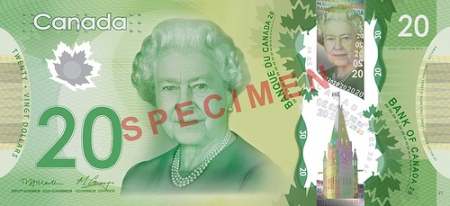
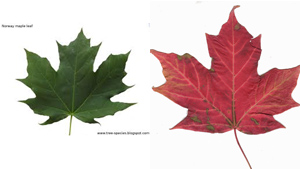

 Radio New Zealand
Radio New Zealand  Macau has
Macau has  Singapore in the meantime has a tradition of presenting clean crisp new banknotes to family and friends for Hong Bao, the Lunar New Year. The
Singapore in the meantime has a tradition of presenting clean crisp new banknotes to family and friends for Hong Bao, the Lunar New Year. The  Samoa has issued a new type of their 100 Tala note. The image is more are less the same as the old note but this one has new signatures (
Samoa has issued a new type of their 100 Tala note. The image is more are less the same as the old note but this one has new signatures (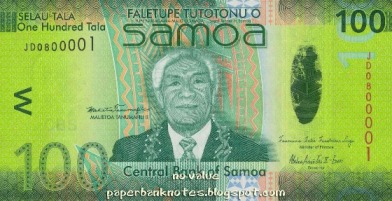
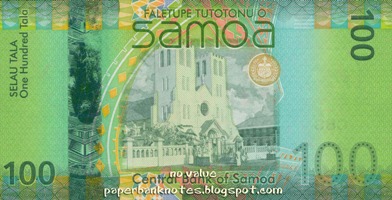

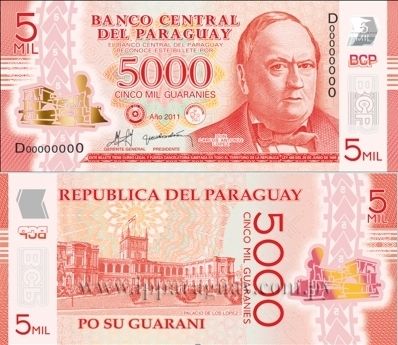
 Besides the presentation of the
Besides the presentation of the 

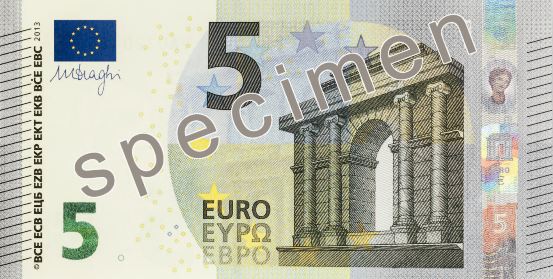
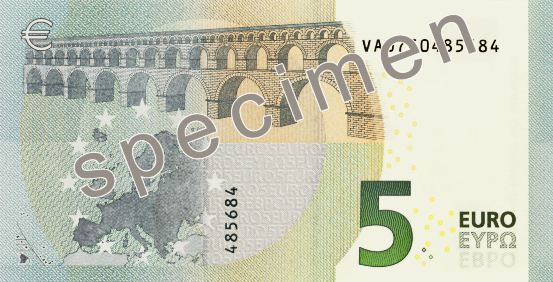
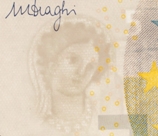
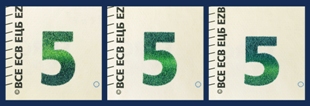
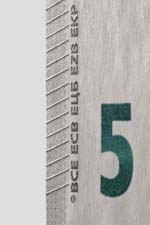
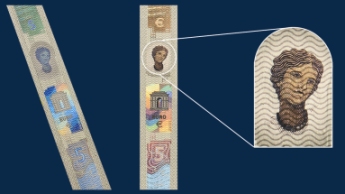
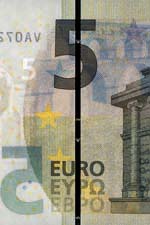
 I just saw this great numismatic product mentioned at
I just saw this great numismatic product mentioned at 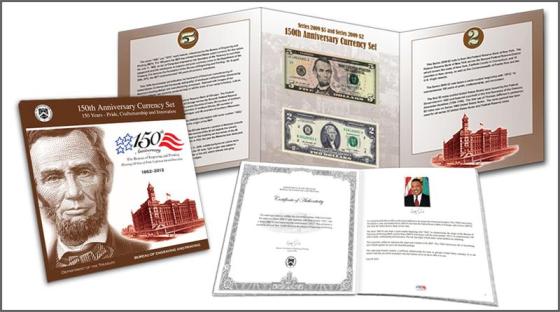
 The
The 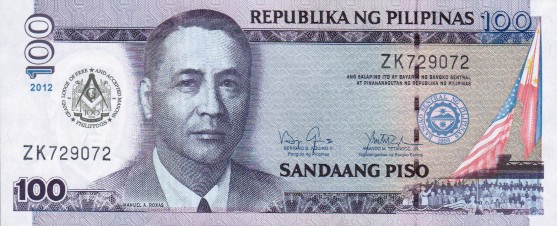
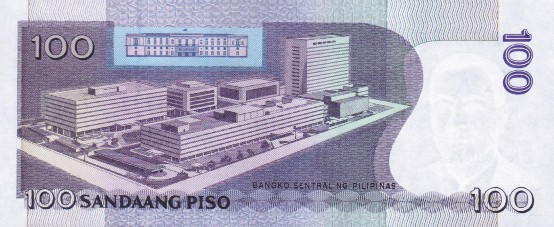
 And after
And after  A story from war torn Somalia today. The Somali federal government
A story from war torn Somalia today. The Somali federal government 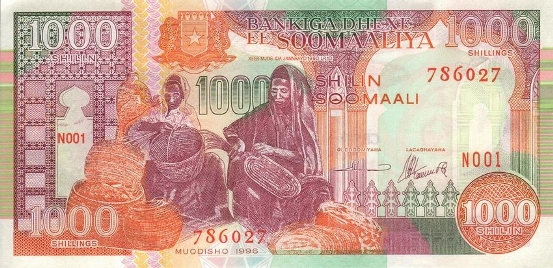
 The
The 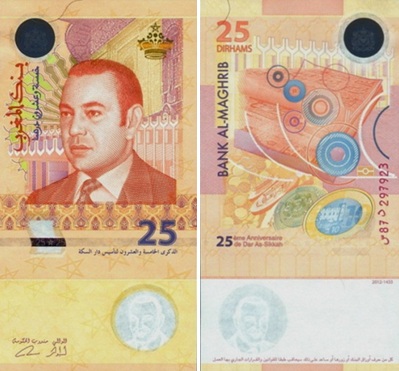
 Do you sometimes have that feeling that you've made something really pretty like a painting of your dog and after it's done, somebody comes along and mentions that you've forgotten to paint a tail? That must have been the feeling the
Do you sometimes have that feeling that you've made something really pretty like a painting of your dog and after it's done, somebody comes along and mentions that you've forgotten to paint a tail? That must have been the feeling the 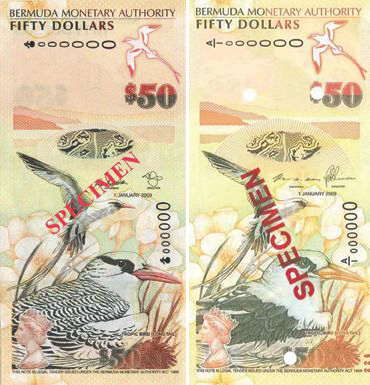
 As announced in this
As announced in this 